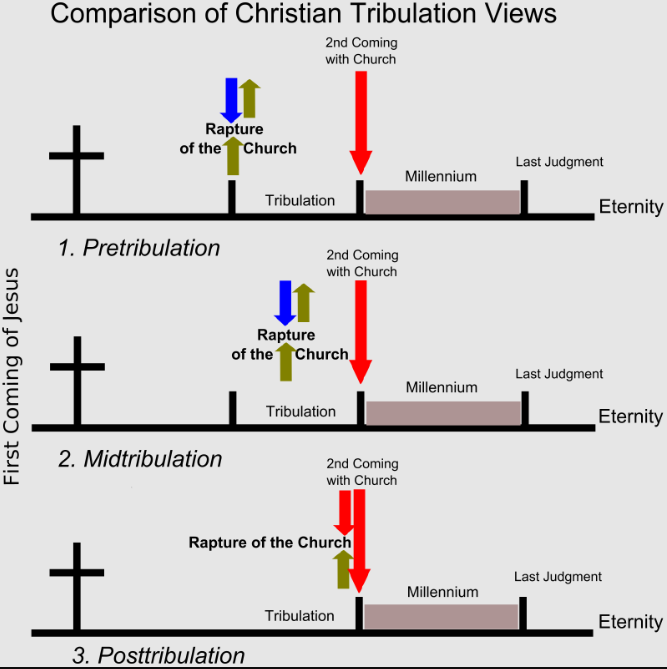
As I’ve watched the rise of Christian nationalism here in the US, and as I read about it rising in other nations around the world, and I’ve watched the behavior and language and voting and electioneering and politics by the American evangelical community, I’ve begun to realize that most evangelicals assume that if we just do some things right, Jesus returns and inaugurates the final “boss fight” and kicks butt and takes names. Without any further real fuss on our part, the Kingdom arrives soon after. With any luck, we get to enjoy the whole show from heaven, not here in the midst of the hurt.
And I can’t really blame them for this belief. That’s what they were raised to believe. That’s what their pastors were raised to believe. It’s the belief that I inherited – which is why I understand it so well. Ever since The Rapture appeared as a theological construct in the mid 1830s, a central fixture of evangelical thought has been the idea that we’re all going to be whisked away someday soon, and that day will be triggered when God’s people finally get around to sharing the gospel with all nations.
And even apart from that idea, the more recent ideas of “Dominion Theology” or “Christian Reconstructionism” (originated by R.J. Rushdoony in the 1960s) and the “Seven Mountains Mandate” (originated in the 1970s by Bill Bright, Loren Cunningham, and Franscis Schaeffer), started to convince Christians that if they just take over all of society’s areas of influence, then Christians can establish the Kingdom on earth and trigger the end times.

Both of these ideas are, in my sense, unbiblical. They bear the loose support of some scripture proof-texts, but in my view, they conflict with the larger testimony of the Bible.
As I’ve gone through a rather systematic and in-depth reassessment of everything I grew up believing about God and the Bible and doctrine and dogma since 2020, I’ve concluded that very little of my former ideas held up under careful scrutiny. And in this context, I find it far more likely that we humans will inhabit this planet for quite a bit longer than the evangelicals think we will. God is interested in our faithfulness to do the work of Jesus, looking forward to the Kingdom, helping to build for the Kingdom here and now, but not making any assumptions that our work will magically trigger it soon, and certainly not assuming that this work doesn’t eternally matter because it’s all going to burn soon.
Here’s a simple chart that shows a general idea I have about our “progress” towards the true Kingdom of God on earth.

The history of the Church all starts at the cross, of course. With the conclusion of Jesus’ ministry, the Church exploded in influence for a period of time. Then came severe challenges, and the Church retreated somewhat. A couple centuries later, Constantine triggered a resurgence of Christian activity and faith. That surged for a while, but then suffered setbacks. This cycle continued through the ages: the Church appears to advance suddenly, then it seems to fall, but there always seems to be more steps forward than back. So now, we find ourselves here in the early 21st century after (at least in America) a few decades of apparent positive activity, but suddenly we see a couple of troubling things happening.
1) The participation rate in American “churchianity” has been dropping steadily. Surveys of American religion have been showing stark losses – down about 12% across US adults since 2000; just 30% now typically attend church regularly. Young adult regular church participation is even lower, less than 25%; worse still, 35% of them have no religious affiliation at all.
https://news.gallup.com/poll/642548/church-attendance-declined-religious-groups.aspx

Even before the pandemic, churches were losing over a million attendees per year: averaged across congregations, consultants tell them to expect to lose about 10 to 15% of their membership per year.
2) Because of these statistics, the remaining faithful are grappling with what is causing the decline. After all, in the evangelical mind, they hold the Truth and evangelical churches should be attracting people, and for decades that was true. And for decades they’ve disparagingly pointed at mainline churches which were already struggling, gleefully pointing to their own rising numbers. And more than that, they’ve looked across the Atlantic and pointed out the struggles Europe and the UK have had with horrible church participation, and concluded that we Americans somehow know how to do church better than them.
But suddenly they find themselves, along with the mainline churches, in the same boat. And it’s truly scary. Why is it happening? What’s going wrong?
The answer they most often select seems to be that it’s not their fault; it’s the decay of society, the loss of morals, the rise of sinful lifestyles. It’s those heathens who refuse to follow the Word of God.
Because of this conclusion, they seem to believe that the solution to their own loss of membership and influence is to stop the decline of society. The method, in most cases, is more laws for moral behavior.
In other words, we’re right back to discussing the Seven Mountains Mandate: if Christians take over all aspects of society, and impose Christian principles on how everyone behaves, people will stop losing their morals and will return to God, and the churches will fill up again.
Looking at the timeline chart again, we seem to be at the “We are here” inflection point where one of two things could happen.

From the evangelical point of view, if we just do the right things, we inaugurate the Kingdom of God on earth. If we don’t, society will slip backwards just like it has so many times before, and it will take decades or more to recover.
Here’s a problem with the logic, however: it’s looking rather myopically at America, and assuming that America really represents the entire Kingdom. If here in America we do the right things, according to this view (which I reject), then Christians around the entire world will suddenly be raptured and the Kingdom inaugurated.

In reality (and I think that this conflicts with what a lot of American evangelicals arrogantly assume), America is hardly a bellwether for the whole world. American Christians don’t determine what happens to the Kingdom. How arrogant!
As a matter of fact, as good as democracy has the potential to be compared to many other forms of government, I have said for many years that it’s likely that God will not tolerate liberal democracy to be exalted as The Kingdom; in my sense, even America’s form of government, and all its systems, will ultimately need to fail, so that God will demonstrate to the watching world that not even the Great American Experiment is truly what is needed in the Kingdom. There are simply too many rank injustices in America for any really dispassionate observer to conclude that this form of government is actually completely Godly and holy. Given that self-interest is the true root of capitalism, I do not believe it’s possible to start from our fundamentally self-focused government and our sociopolitical system and end up in a Christlike Kingdom. It may work for a season, and be good for some human flourishing, but it isn’t eternal, and it certainly isn’t perfect.
So when we step back a bit and look at the entire world, and we observe a lot of places where the Kingdom actually IS advancing, even while we also see many ways in which the worst of humanity is on obvious display, I think we have to stop focusing so hard on America.
It’s so deeply nationalist, so focused on whether OUR nation’s Seven Mountains are Godly, that I haven’t seen any hint of concern for “what next.” What if they do win this culture war? And there’s so little concern about cherishing what other nations already have.
I think the obvious answer is that they’ve spent so long navel-gazing about American problems that they’ve never stopped to think deeply about the entire world. It’s all about us, our Mountains, taking over OUR government – and assuming our cultural context is sufficient for a whole planet.
So the other problem with using American Christianity as the measure of the progress towards the Kingdom is that if we want to see the Kingdom come, to see God’s will be done, it’s too easy to be harmfully colonial. American Christians might fix their issues, but then realize that Jesus didn’t actually return like they thought, realize that maybe the REST of the world needs to align also, and conclude that we must then aggressively export our culture, our Seven Mountain solution, into the rest of the world, wiping out what’s there in the name of Kingdom. That has already happened many times. For example, there already were plenty of believers in Africa – it’s where some of the Bible was written, for crying out loud – but American evangelists and missionaries couldn’t see God in their worship because it didn’t look enough like our bigoted Western Christian cultural expectation, and so they tried to – and in many cases successfully – replace a thriving African faith with a stilted and myopic American one. This colonialism happened many times and continues to happen around the world.
And worse still, in the American evangelical mind, America actually is the spiritual replacement for Israel. They pay lip service to the worldwide church, but pay zero attention to how the Church in those other nations see the world. Other Christian cultures look with horror on America’s church – especially in the last few years over their sycophantic support for the very unChristian Donald Trump, churchianity’s growing consumerism, and its lack of focus on human rights and oppression.
https://www.evangelicalfellowship.ca/Communications/Dispatches-from-Brian-Stiller/February-2021/How-Do-Non-American-Evangelicals-Respond-to-the-U.aspx
https://reformreporter.com/how-do-christians-globally-view-america/
And they certainly disagree that America has some special relationship to the Kingdom. Here’s a chart showing the historical and expected makeup of global Christianity. North America is already a rather small fraction of the whole, and will likely continue to be a smaller fraction, and the rest of the worldwide Church knows this.

Of course, it never WAS about any one nation. God’s story throughout the Bible was that EVERY tribe and tongue and language and people group would be united around the throne. And that kind of unity can never come from one nation “winning” over the others. In fact, that kind of unity can only come when each and every nation humbles itself before the others, demonstrating true Christlike humility and sacrifice and servanthood. True unity can never come from conquest – only from surrender. Not because the other nation should win – but because our nation SHOULD NOT win. Nobody should “win.”
But that brings me back to American Christians who follow reconstructionism or the Seven Mountains Mandate: That demographic voted overwhelmingly for Donald Trump’s return to the White House, based largely on his promises to give them power to implement their programs and cast down all that they see as false and unrighteous.
I don’t have any problem with the pursuit of righteous government. But what I find objectionable about Seven Mountains Mandate politics is that it is but one particular perspective on what is good and righteous. Seven Mountains Mandate theology is essentially fringe, although most adherents would assert that it’s not. The idea that taking power over others is the path to the Kingdom is far from universal, enough so that if the Seven Mountains Mandate people in America accomplish their legal plans, they will actually be disenfranchising the majority of their fellow American Christians, many of whom sharply disagree with them – not to mention the other billions of Christians around the world.
But in their mind, they’re after that orange line in the timeline graph above: making it to the Kingdom by the fastest, most direct route possible – even if that means squashing a few people along the way.
In other words, it’s the essence of “the ends justify the means.” By that mindset, we can inaugurate the Kingdom of God and bring peace on earth in very short order – if we violently shoulder aside anyone who disagrees with us.
Lest that sound alarmist or over-hyped, consider that in this recent election season there were countless calls for violence against certain minority groups that stand in their way: execute the gays and the trans people – even Black people, Jews, and anyone who isn’t a Christian. It’s people like white supremacist Nick Fuentes (who was booked in December 2024 for violence against a woman who rang his doorbell) who has tens of thousands of followers, and many more besides him.
https://ffrf.org/news/releases/white-christian-nationalist-calls-for-death-penalty-for-all-non-christians/
https://www.msn.com/en-us/news/us/nick-fuentes-charged-with-battery-of-woman-he-maced-report-says/ar-AA1vpGE5
The Public Religion Research Institute and the Brookings Institution found last year that 23% of Americans and 41% of Trump supporters are in favor of violence to achieve their political ends.
https://www.msnbc.com/opinion/msnbc-opinion/trump-evangelical-supporters-political-violence-poll-rcna122023
And don’t lose sight of the fact that in their minds, these ends are not just political: they’re directly religious ends, the steps necessary to inaugurate the Kingdom and trigger the Rapture.
It’s important to reiterate that while there may be great political support in general for Christian values, and while many believers in America mourn the perceived decline of morals, it’s the evangelical Christian Americans who are favoring violence in support of their goal of restoration.
So looking again at this cusp upon which we Americans find ourselves, what should we do? How can we move up the orange line, and not fall back down the blue line?
That may be the wrong question. I actually think that blue line is a fundamental misunderstanding of what’s going on. More precisely, I think it’s focused on the micro, not the macro.
As a matter of fact, I personally think that you can just draw a steady trajectory from the Cross right through today and continuing towards a full revelation of the Kingdom of God.

I really do think that this last few years of what LOOKS like falling away in America is actually a purging of the true Church of its error, of those who would so glibly surrender the principles of Jesus to a crass, un-Christlike strongman in exchange for a seat of power, of those who would willingly ride the Beast with the prostitute church in Revelation 17, of those who think they are doing the work of God but to whom Jesus would actually say, as in Matt 25:41, “Depart from me.”

I haven’t believed in the Rapture for a few years now, and I no longer believe that a careful reading of the Bible indicates that God is going to ride out anytime soon with a sword and slaughter all His enemies. Yes, that was John’s imagery, but I just don’t think he was prophesying about our future, and we modern Christians are under no obligation to read our future into his apocalyptic statements to his contemporaries about Rome.
So I’m not looking at our world and wondering what I can do to trigger the sudden return of Jesus. Instead, I think the faithful reading of scripture would have me ask, what can I do within my personal sphere of influence to make the world more like the Kingdom; what can I do like Jesus said in Matt 25:31-46 to give the hungry something to eat, to invite in the stranger, to clothe the naked, to look after the prisoner. It’s not even about who I can elect that will make those things happen – bless God if the politicians do, but the Bible talks about each of us making disciples, not about making an empire.
Jesus very clearly said His Kingdom was not of this world. We need to stop trying to change His mind about that.
And beyond that, it’s about being an attractive and faithful representation of Jesus to those around me, instead of forcing them to abide by my values and readings of the Bible. I’m so done with this idea that we can coerce nonbelievers into any righteousness by the force of law. In the history of Christianity, it’s been tried time and time again, and so far it’s never worked once. It may have had a brief appearance of working, but the history shows that the result in the longer run was often toxic, and at best ineffective at producing “a harvest of righteousness.”
17 But the wisdom that comes from heaven is first of all pure; then peace-loving, considerate, submissive, full of mercy and good fruit, impartial and sincere. 18 Peacemakers who sow in peace reap a harvest of righteousness. (James 3:17-18)
I mean, look at the evidence: here we are some 2000 years after the Bible was written, and the Kingdom isn’t yet complete. It’s here – it arrived with Jesus – and it’s advancing, but any idea that we can flip some political switch and make it suddenly jump to completion, like that orange line on the timeline, is just silly.
Instead, we have to be comfortable with seeing the Kingdom advance in what looks, to our temporal perspective, like fits and starts. Like moving forward three steps, and then falling back two.
And we REALLY need to get over this idea that God NEEDS us to inaugurate the Kingdom or the Rapture. The Kingdom is already here. Jesus said as much 2000 years ago. God seems intent on partnering with us, but our success or failure won’t change the final outcome or God’s timeline.
To summarize all of this, we have to be in this thing for the long run. And we need to stop trying to discover magic solutions. We will not find any new way to suddenly make lots of mature disciples. It’s just not a process that lends itself to efficiency or scale. It has to be done one on one. And it cannot be done without sacrifice and death to self.
